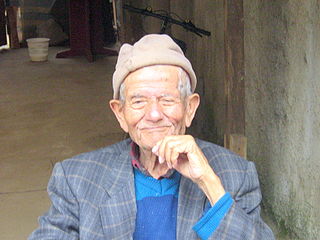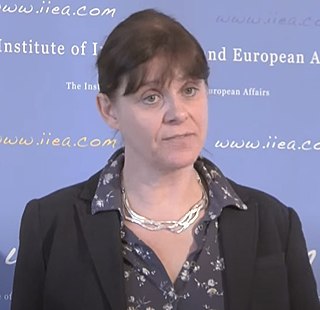Related Research Articles
Retirement is the withdrawal from one's position or occupation or from one's active working life. A person may also semi-retire by reducing work hours or workload.

Old age is the range of ages for people nearing and surpassing life expectancy. People of old age are also referred to as: old people, elderly, elders, seniors, senior citizens, or older adults. Old age is not a definite biological stage: the chronological age denoted as "old age" varies culturally and historically. Some disciplines and domains focus on the aging and the aged, such as the organic processes of aging (senescence), medical studies of the aging process (gerontology), diseases that afflict older adults (geriatrics), technology to support the aging society (gerontechnology), and leisure and sport activities adapted to older people.

Population ageing is an increasing median age in a population because of declining fertility rates and rising life expectancy. Most countries have rising life expectancy and an ageing population, trends that emerged first in developed countries but are now seen in virtually all developing countries. That is the case for every country in the world except the 18 countries designated as "demographic outliers" by the United Nations. The aged population is currently at its highest level in human history. The UN predicts the rate of population ageing in the 21st century will exceed that of the previous century. The number of people aged 60 years and over has tripled since 1950 and reached 600 million in 2000 and surpassed 700 million in 2006. It is projected that the combined senior and geriatric population will reach 2.1 billion by 2050. Countries vary significantly in terms of the degree and pace of ageing, and the UN expects populations that began ageing later will have less time to adapt to its implications.

Elderly care, or simply eldercare, serves the needs of old adults. It encompasses assisted living, adult daycare, long-term care, nursing homes, hospice care, and home care.

Sexuality in older age concerns the sexual drive, sexual activity, interests, orientation, intimacy, self-esteem, behaviors, and overall sexuality of people in middle age and old age, and the social perceptions concerning sexuality in older age. Older people engage in a variety of sexual acts from time to time for a variety of reasons. Desire for intimacy does not disappear with age, yet there are many restrictions placed on the elderly preventing sexual expressions and discouraging the fulfillment of sexual needs. Sexuality in older age is often considered a taboo, yet it is considered to be quite a healthy practice; however, this stigma can affect how older individuals experience their sexuality. While the human body has some limits on the maximum age for reproduction, sexual activity can be performed or experienced well into the later years of life.

Disability-adjusted life years (DALYs) are a measure of overall disease burden, expressed as the number of years lost due to ill-health, disability, or early death. It was developed in the 1990s as a way of comparing the overall health and life expectancy of different countries.
Multimorbidity, also known as multiple long-term conditions (MLTC), means living with two or more chronic illnesses. For example, a person could have diabetes, heart disease and depression at the same time. Multimorbidity can have a significant impact on people's health and wellbeing. It also poses a complex challenge to healthcare systems which are traditionally focused on individual diseases. Multiple long-term conditions can affect people of any age, but they are more common in older age, affecting more than half of people over 65 years old.
The Health and Retirement Study (HRS) is a longitudinal survey of a representative sample of Americans over age 50 conducted by the Survey Research Center (SRC) at the Institute for Social Research (ISR) at the University of Michigan in Ann Arbor and supported by the National Institute on Aging (NIA). The study interviews approximately 20,000 respondents every two years on subjects like health care, housing, assets, pensions, employment and disability. The study is managed through a cooperative agreement between the NIA, which provides primary funding, and the ISR, which administers and conducts the survey. Beginning in 2012, HRS began adding genetic information from consenting participants to its database. The economic measures captured by the data in the HRS are regarded as being of very high quality.

The Survey of Health, Ageing and Retirement in Europe (SHARE) is a multidisciplinary and cross-national panel database of micro data on health, socio-economic status and social and family networks. In seven survey waves to date, SHARE has conducted approximately 380,000 interviews with about 140,000 individuals aged 50 and over. The survey covers 28 European countries and Israel.
The English Longitudinal Study of Ageing (ELSA) is a longitudinal study that collects multidisciplinary data from a representative sample of the English population aged 50 and older to look at all aspects of aging in England.

Many retirement issues for lesbian, gay, bisexual, transgender (LGBT) and intersex people are unique from their non-LGBTI counterparts and these populations often have to take extra steps addressing their employment, health, legal and housing concerns to ensure their needs are met. Throughout the United States, "2 million people age 50 and older identify as LGBT, and that number is expected to double by 2030", estimated in a study done by the Institute for Multigenerational Health at the University of Washington. In 1969, the Stonewall Riots marked the start of the modern gay rights movement and increasingly LGBTQ+ people have become more visible and accepted into mainstream cultures. LGBTQ+ elders and retirees are still considered a newer phenomenon creating challenges and opportunities as a range of aging issues are becoming more understood as those who live open lives redefine commonly held beliefs and as retirees newly come out of the closet.
The Study on global AGEing and adult health (SAGE) is run by the World Health Organization. An objective for SAGE is to compile comprehensive longitudinal data on the health and well-being of adult populations and the ageing process across different countries, through primary data collection, secondary data analysis and cross-study collaborations.
Ageing is the process of becoming older. The term refers mainly to humans, many other animals, and fungi, whereas for example, bacteria, perennial plants and some simple animals are potentially biologically immortal. In a broader sense, ageing can refer to single cells within an organism which have ceased dividing, or to the population of a species.
Ikigai is a Japanese concept referring to something that gives a person a sense of purpose, a reason for living.
The China Health and Retirement Longitudinal Study (CHARLS) is a longitudinal survey being conducted by the China Center for Economic Research at Peking University with Professor Yaohui Zhao of Peking University serving as Principal Investigator and Professors John Strauss of the University of Southern California and Albert Park of HKUST Institute for Emerging Market Studies serving as co-Principal Investigators.

Sarah Harper FRAI CBE is a British gerontologist, who established Oxford's Institute of Population Ageing, and became the University of Oxford's first Professor of Gerontology. She served on the Prime Minister's Council for Science and Technology between 2014 and 2017 and in 2017 was appointed Director of the Royal Institution of Great Britain. Sarah was appointed a CBE in 2018 for services to the Science of Demography.
Sexually active life expectancy is the average number of years remaining for a person to be sexually active. This population-based indicator extends the concept of health expectancy to the measure of sexuality. Calculation of sexually active life expectancy uses the age-specific prevalence data on sexual activity in conjunction with life table data on survival probabilities to partition the number of person-years into years with and without sexual activity, which is based on the Sullivan method. The Sullivan method's objective is to understand the change of health in a given population over time.
Aging has a significant impact on society. People of different ages and gender tend to differ in many aspects, such as legal and social responsibilities, outlooks on life, and self-perceptions. Young people tend to have fewer legal privileges, they are more likely to push for political and social change, to develop and adopt new technologies, and to need education. Older people have different requirements from society and government, and frequently have differing values as well, such as for property and pension rights. Older people are also more likely to vote, and in many countries the young are forbidden from voting. Thus, the aged have comparatively more, or at least different, political influence.
Elder rights are the rights of older adults, who in various countries are not recognized as a constitutionally protected class, yet face discrimination across many aspects of society due to their age.
The Women's Healthy Ageing Project (WHAP) is the longest ongoing medical research project examining the health of Australian women. Its landmark studies concern women's heart and brain health, a long-neglected area of specialised research.
References
- ↑ Khan, Hafiz T. A; Flynn, Matt (2016), "Self-Reported Health Status of Older Adults in Malaysia and Singapore: Evidence from the 2007 Global Ageing Survey" (PDF), Applied Research in Quality of Life, 11 (3), Springer (published 2016-09-01): 687(19), doi:10.1007/s11482-015-9390-2, ISSN 1871-2584, S2CID 73623496, archived (PDF) from the original on 2023-08-10, retrieved 2022-10-10
- ↑ "Research Conducted at University of Oxford Has Updated Our Knowledge about Quality of Life Research (Self-Reported Health Status of Older Adults in Malaysia and Singapore: Evidence from the 2007 Global Ageing Survey)", Health & Medicine Week, NewsRX LLC: 323, 2016-10-14, ISSN 1531-6459
- ↑ "Oxford Institute of Population Ageing - University of Oxford". Oxford Institute of Population Ageing. Archived from the original on 2019-05-16. Retrieved 2019-05-21.
- ↑ "Global survey on ageing and retirement - HSBC". Archived from the original on 2009-01-09. Retrieved 2009-04-21.